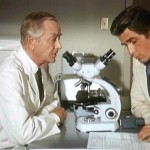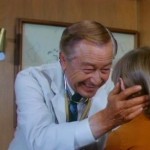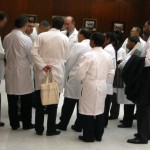 As a practicing pediatrician, I, too, feel the nobility and privilege of my profession, and count myself lucky every day that I am able to do what I do. But to denigrate lawyers and journalists as somehow less valuable to society is beneath us as a profession. Read more
As a practicing pediatrician, I, too, feel the nobility and privilege of my profession, and count myself lucky every day that I am able to do what I do. But to denigrate lawyers and journalists as somehow less valuable to society is beneath us as a profession. Read more
Category Archives: Health & Medicine
I’m now a regular blogger on ConsultantLive
 I‘m now a monthly guest blogger on ConsultantLive, and my first post appeared today. It’s the one where Marcus Welby gives a speech on the rewards of general practice as opposed to specialization. … My column on the site is called “How Health Happened.” It’s mainly about the history of 20th century medicine and how that relates to changing attitudes towards health. Read more
I‘m now a monthly guest blogger on ConsultantLive, and my first post appeared today. It’s the one where Marcus Welby gives a speech on the rewards of general practice as opposed to specialization. … My column on the site is called “How Health Happened.” It’s mainly about the history of 20th century medicine and how that relates to changing attitudes towards health. Read more
The tyranny of health then and now
 When we hear the words “tyranny of health” these days, it’s usually a reference to the tyranny of health care. It brings to mind images of protesters carrying signs that denounce the “socialism” of Obamacare. As recently as 1994, however, the tyranny of health had a different meaning … the idea that patients should be coerced into being healthy. Read more
When we hear the words “tyranny of health” these days, it’s usually a reference to the tyranny of health care. It brings to mind images of protesters carrying signs that denounce the “socialism” of Obamacare. As recently as 1994, however, the tyranny of health had a different meaning … the idea that patients should be coerced into being healthy. Read more
“Tyranny of health” on KevinMD
 That we’re not routinely made seriously ill by this shortfall … is due largely to the fact that most medical interventions and advice don’t address life-and-death situations, but rather aim to leave us marginally healthier or less unhealthy, so we usually neither gain nor risk all that much. Read more
That we’re not routinely made seriously ill by this shortfall … is due largely to the fact that most medical interventions and advice don’t address life-and-death situations, but rather aim to leave us marginally healthier or less unhealthy, so we usually neither gain nor risk all that much. Read more
Medicalization then and now
 The American Medical Association once complained about rival practitioners who invented new diseases. A hundred years later, medical thought leaders (also known as Key Opinion Leaders) are paid to promote new diseases.
The American Medical Association once complained about rival practitioners who invented new diseases. A hundred years later, medical thought leaders (also known as Key Opinion Leaders) are paid to promote new diseases.
Is this progress? Read more
Soft drinks and food stamps: From bad to worse
 Science aside, I find it objectionable to single out low-income people for control by their government. Let’s not further insult the dignity of those who need food stamps in these difficult economic times by fighting the obesity battle on their backs. Read more
Science aside, I find it objectionable to single out low-income people for control by their government. Let’s not further insult the dignity of those who need food stamps in these difficult economic times by fighting the obesity battle on their backs. Read more
Once in a lifetime: Marcus Welby and David Bryne
 Marcus Welby was not necessarily the inspiration here, of course. Alienation – and the dissatisfaction that comes with a midlife crisis — pervaded the zeitgeist in the seventies.
Marcus Welby was not necessarily the inspiration here, of course. Alienation – and the dissatisfaction that comes with a midlife crisis — pervaded the zeitgeist in the seventies.
Whatever happened to alienation, anyway? Perhaps it fell along with the Berlin Wall. Or succumbed to Prozac. Read more
Marcus Welby vs. the specialists
 Tell me, doctors, are you a specialist or a GP? Or sometimes they say “or just a GP?” But of course we are specialists. And our specialty, like any other, has certain advantages and certain disadvantages. The money is good, but you have to work three times as hard for it. But you people know all about that. Read more
Tell me, doctors, are you a specialist or a GP? Or sometimes they say “or just a GP?” But of course we are specialists. And our specialty, like any other, has certain advantages and certain disadvantages. The money is good, but you have to work three times as hard for it. But you people know all about that. Read more
Health care reform and the 2010 elections
 Bottom line: If you want to avoid a government shutdown, or the “dysfunctional and failed republic” scenario, vote on November 2 for candidates who support health care reform. Read more
Bottom line: If you want to avoid a government shutdown, or the “dysfunctional and failed republic” scenario, vote on November 2 for candidates who support health care reform. Read more
Should doctors work weekends?
 Orszag is an economist who wants the medical “industry” to be run as efficiently as any other business. “[I]f you can’t measure it, you can’t manage it,” he says. But medicine is not like other business ventures. For one thing, its services are responsible for the life, death, and suffering of human beings. This is unique. Also, it doesn’t operate with the usual economic model of supply, demand, and shopping for competitive prices. When health hangs in the balance, time is limited and choices are few. You don’t decide to forego surgery the way you postpone the purchase of a new car. Read more
Orszag is an economist who wants the medical “industry” to be run as efficiently as any other business. “[I]f you can’t measure it, you can’t manage it,” he says. But medicine is not like other business ventures. For one thing, its services are responsible for the life, death, and suffering of human beings. This is unique. Also, it doesn’t operate with the usual economic model of supply, demand, and shopping for competitive prices. When health hangs in the balance, time is limited and choices are few. You don’t decide to forego surgery the way you postpone the purchase of a new car. Read more
The dismal future of unemployment
 The only thing highly developed countries can do in the face of cheap foreign labor is to play their ace card. Where these countries excel is with industries that are knowledge intensive – “capital-intensive advanced industries where knowledge counts for everything.” But we are unable to teach the skills required for those jobs as rapidly as the need for employment requires. Those skills constantly go out of date. Read more
The only thing highly developed countries can do in the face of cheap foreign labor is to play their ace card. Where these countries excel is with industries that are knowledge intensive – “capital-intensive advanced industries where knowledge counts for everything.” But we are unable to teach the skills required for those jobs as rapidly as the need for employment requires. Those skills constantly go out of date. Read more
We’re all on Prozac now
Side Effects May Include
Now available
over the counter, the phone, or the Internet—
even on the corner—
with or without a subscription.Clinically proven to
counteract depressed mood,
soothe frazzled nerves,
decrease heart and respiratory rate …
Why don’t hospital workers wash their hands?
 Am I missing something here or does this say we shouldn’t publicize information about hospitals with poor hygiene because they’ll just lie about the facts or be otherwise devious and dishonest? Plus, reputation – that is, the financial profits of medicine – is more important than the health and safety of patients? No, it couldn’t be saying that. Read more
Am I missing something here or does this say we shouldn’t publicize information about hospitals with poor hygiene because they’ll just lie about the facts or be otherwise devious and dishonest? Plus, reputation – that is, the financial profits of medicine – is more important than the health and safety of patients? No, it couldn’t be saying that. Read more
Should psychiatrists go to med school?
 One of the problems Carlat readily acknowledges is that psychiatry is excessively focused on psychopharmaceuticals at the expense of other effective treatments. Not only is there too much focus when it comes to treatment. There’s so much money flowing from the pharmaceutical industry to psychiatrists that one has to seriously question the profession’s ability to be objective. Read more
One of the problems Carlat readily acknowledges is that psychiatry is excessively focused on psychopharmaceuticals at the expense of other effective treatments. Not only is there too much focus when it comes to treatment. There’s so much money flowing from the pharmaceutical industry to psychiatrists that one has to seriously question the profession’s ability to be objective. Read more
Should grief be labeled and treated as depression?
 The American Psychiatric Association (APA) is in the process of revising the Diagnostic and Statistical Manual of Mental Disorders (DSM) – the psychiatrist’s bible. Its last incarnation — known as DSM IV — was published in 2000. The new version will be DSM V. … One item in dispute is whether bereavement – the grieving process that follows the loss of a loved one – might qualify a patient for the DSM label Major Depressive Episode. Read more
The American Psychiatric Association (APA) is in the process of revising the Diagnostic and Statistical Manual of Mental Disorders (DSM) – the psychiatrist’s bible. Its last incarnation — known as DSM IV — was published in 2000. The new version will be DSM V. … One item in dispute is whether bereavement – the grieving process that follows the loss of a loved one – might qualify a patient for the DSM label Major Depressive Episode. Read more
Support the Fair Elections Now Act
 Watching political news on TV can be depressing and distressing. Even the most respectable news organizations treat politics as a sporting event. The Fair Elections Now Act is a chance to express support for something that could make a positive and important difference in the legislative future of the United States. It would be an enormous win for the common good. Read more
Watching political news on TV can be depressing and distressing. Even the most respectable news organizations treat politics as a sporting event. The Fair Elections Now Act is a chance to express support for something that could make a positive and important difference in the legislative future of the United States. It would be an enormous win for the common good. Read more
Lobbying against formula for babies
 You might think that companies confident in their products’ value would welcome the chance for a federal stamp of approval, not fight it. But the Big Three formula manufacturers—Nestle, Mead Johnson, and Abbot Laboratories – did just that. … Without a show of courage from the House leadership, the story of WIC and functional ingredients could turn out to be yet another well-known Washington narrative — powerful, wealthy corporations fighting straightforward, evidence-based policymaking. Read more
You might think that companies confident in their products’ value would welcome the chance for a federal stamp of approval, not fight it. But the Big Three formula manufacturers—Nestle, Mead Johnson, and Abbot Laboratories – did just that. … Without a show of courage from the House leadership, the story of WIC and functional ingredients could turn out to be yet another well-known Washington narrative — powerful, wealthy corporations fighting straightforward, evidence-based policymaking. Read more
Century-old kerfuffle over the “syrup” in corn syrup
 I see that the Corn Refiners Association is petitioning the FDA to change the name of their ingredient – as it appears on food labels — from corn “syrup” to corn “sugar.” There’s an amusing footnote to this story. A hundred years ago, Karo Corn Syrup – a product still on the market – was fighting to be listed as “syrup,” not glucose (a simple sugar), on its label. Read more
I see that the Corn Refiners Association is petitioning the FDA to change the name of their ingredient – as it appears on food labels — from corn “syrup” to corn “sugar.” There’s an amusing footnote to this story. A hundred years ago, Karo Corn Syrup – a product still on the market – was fighting to be listed as “syrup,” not glucose (a simple sugar), on its label. Read more
Merchants of Doubt
 It’s easy to understand – if not condone – the behavior of politicians who are financed by tobacco and oil companies. They oppose the regulation of smoking or pollution because they benefit from the financial contributions of those industries. But what motivates certain scientists to relentlessly cast doubt on peer-reviewed scientific evidence that’s inconveniently contrary to financial interests? Read more
It’s easy to understand – if not condone – the behavior of politicians who are financed by tobacco and oil companies. They oppose the regulation of smoking or pollution because they benefit from the financial contributions of those industries. But what motivates certain scientists to relentlessly cast doubt on peer-reviewed scientific evidence that’s inconveniently contrary to financial interests? Read more
Childhood obesity and will power
 Between 1985 and 2000, the retail price of carbonated soft drinks rose by 20%, the prices of fats and oils by 35%, and those of sugars and sweets by 46%, as compared with a 118% increase in the retail price of fresh fruits and vegetables. …
Between 1985 and 2000, the retail price of carbonated soft drinks rose by 20%, the prices of fats and oils by 35%, and those of sugars and sweets by 46%, as compared with a 118% increase in the retail price of fresh fruits and vegetables. …
Healthy, low-calorie foods cost more money and take more effort to prepare than processed, high-calorie foods. … Drewnowski estimated that a calorie-dense diet cost $3.52 a day compared with $36.32 a day for a low-calorie diet.
Read more
The art and science of medicine
 A more nuanced translation of Hippocrates’ original Greek text might read: Life is too short; the task is huge; the right time is like a razor blade; the road to experience is fraught with hazards; to continuously accept reality and critical thought over hope and prejudice is taxing. Read more
A more nuanced translation of Hippocrates’ original Greek text might read: Life is too short; the task is huge; the right time is like a razor blade; the road to experience is fraught with hazards; to continuously accept reality and critical thought over hope and prejudice is taxing. Read more
The pleasures and complexities of taste
 Back in March and April of 2009 I wrote a long series of posts on taste. I got interested in it through the idea of supertasters – individuals who are overly sensitive to certain bitter tastes and, as a result, have their own set of food preferences. When More Time Than Dough contacted me about quoting from one of those posts, I decided to clean them up and present them as a series. Read more
Back in March and April of 2009 I wrote a long series of posts on taste. I got interested in it through the idea of supertasters – individuals who are overly sensitive to certain bitter tastes and, as a result, have their own set of food preferences. When More Time Than Dough contacted me about quoting from one of those posts, I decided to clean them up and present them as a series. Read more
Knowing when you’ll die: Tony Judt’s last interview
 I have no idea where I’ll be next month. I could be silent. I could be dead. I could be exactly like this. I could be in a variety of stages. But I know, absolutely with certainty – within reason – that I’ll be dead in five years. And that reversal of consciousness means that I am very focused upon life in the next two weeks. Read more
I have no idea where I’ll be next month. I could be silent. I could be dead. I could be exactly like this. I could be in a variety of stages. But I know, absolutely with certainty – within reason – that I’ll be dead in five years. And that reversal of consciousness means that I am very focused upon life in the next two weeks. Read more
Teens benefit from later school start time
 As kids approach puberty, scientists now know, there is a two-hour shift in when their bodies release melatonin, the hormone that causes sleepiness. As a result, teens and preteens find it impossible to fall asleep until about 11 p.m., even if they try to go to bed earlier. Yet teenagers still need an average of 9.25 hours of slumber each night. Read more
As kids approach puberty, scientists now know, there is a two-hour shift in when their bodies release melatonin, the hormone that causes sleepiness. As a result, teens and preteens find it impossible to fall asleep until about 11 p.m., even if they try to go to bed earlier. Yet teenagers still need an average of 9.25 hours of slumber each night. Read more
Palliative care: Lost and recovered
 Between those late 19th century discussions of euthanasia as mercy killing and 1975, when Balfour Mount introduced the term palliative care, there was no name for supportive care of the dying. Without a name, there could be no specialists in the subject, no professors to teach it, no training for physicians. There was little discussion of the subject in medical schools. Without a name, the subject could not be indexed and researched in medical literature. There could be no advances in knowledge or improvement in techniques. Read more
Between those late 19th century discussions of euthanasia as mercy killing and 1975, when Balfour Mount introduced the term palliative care, there was no name for supportive care of the dying. Without a name, there could be no specialists in the subject, no professors to teach it, no training for physicians. There was little discussion of the subject in medical schools. Without a name, the subject could not be indexed and researched in medical literature. There could be no advances in knowledge or improvement in techniques. Read more
Physician as lone practitioner
 Bureaucratized shift-work is not good for doctors and it’s not good for patients. I don’t know what the solution will be. Primary care doctors are asking to be paid by the hour, not for piece work. That might help. The wealthy can afford concierge doctors. Maybe something will come out of the medical home concept. If doctors and patients get unhappy enough, perhaps a creative solution will evolve. Read more
Bureaucratized shift-work is not good for doctors and it’s not good for patients. I don’t know what the solution will be. Primary care doctors are asking to be paid by the hour, not for piece work. That might help. The wealthy can afford concierge doctors. Maybe something will come out of the medical home concept. If doctors and patients get unhappy enough, perhaps a creative solution will evolve. Read more
The tyranny of health
 A recent commentary in the Journal of the American Medical Association asks: If individuals don’t use preventive services, “what kind of penalty … would be ethically and morally acceptable?” The question wasn’t “How do we account for unhealthy behavior,” but what punishment would be sufficient either to change that behavior or at least to save money by denying these people health care. Read more
A recent commentary in the Journal of the American Medical Association asks: If individuals don’t use preventive services, “what kind of penalty … would be ethically and morally acceptable?” The question wasn’t “How do we account for unhealthy behavior,” but what punishment would be sufficient either to change that behavior or at least to save money by denying these people health care. Read more
Blogging: Time to get over it
 When political and economic thinking became more conservative in the 1970s and 1980s, governments began to promote the idea that individuals were personally responsible for their health and should practice healthy lifestyles. A large segment of the population – mainly the educated and economically secure – welcomed these ideas. Feeling personally responsible for one’s health and practicing healthy lifestyles gives one the reassuring illusion of control. In particular, it’s a good distraction from the things that are beyond individual control, like salmonella in our peanut butter and the superbug MRSA at the gym. Read more
When political and economic thinking became more conservative in the 1970s and 1980s, governments began to promote the idea that individuals were personally responsible for their health and should practice healthy lifestyles. A large segment of the population – mainly the educated and economically secure – welcomed these ideas. Feeling personally responsible for one’s health and practicing healthy lifestyles gives one the reassuring illusion of control. In particular, it’s a good distraction from the things that are beyond individual control, like salmonella in our peanut butter and the superbug MRSA at the gym. Read more
Prescription drug abuse and the Osbournes
 I remember a scene from The Osbournes where son Jack, recently released from drug rehab, talks about finding a few stray particles of OxyContin dust in his pocket. He immediately consumed them as if his life depended on it. The craving was overwhelming. His description made the feeling of addiction palpable. Read more
I remember a scene from The Osbournes where son Jack, recently released from drug rehab, talks about finding a few stray particles of OxyContin dust in his pocket. He immediately consumed them as if his life depended on it. The craving was overwhelming. His description made the feeling of addiction palpable. Read more
Tony Judt — continued
 “Why is it that here in the United States we have such difficulty even imagining a different sort of society from the one whose dysfunctions and inequalities trouble us so?” he asked from his wheelchair. Read more
“Why is it that here in the United States we have such difficulty even imagining a different sort of society from the one whose dysfunctions and inequalities trouble us so?” he asked from his wheelchair. Read more


